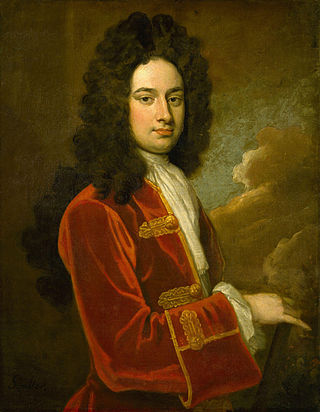This article's list of alumni may not follow Wikipedia's verifiability policy.(August 2011) |
The following notable old boys of Eton College were born in the 15th, 16th and 17th centuries.
This article's list of alumni may not follow Wikipedia's verifiability policy.(August 2011) |
The following notable old boys of Eton College were born in the 15th, 16th and 17th centuries.

Robert Walpole, 1st Earl of Orford,, known between 1725 and 1742 as Sir Robert Walpole, was a British statesman and Whig politician who, as First Lord of the Treasury, Chancellor of the Exchequer, and Leader of the House of Commons, is generally regarded as the de facto first Prime Minister of Great Britain.

James Stanhope, 1st Earl Stanhope was a British Army officer, politician, diplomat and peer who effectively served as Chief Minister between 1717 and 1721. He was also the last Chancellor of the Exchequer to sit in the House of Lords.

Charles Townshend, 2nd Viscount Townshend, was an English Whig statesman. He served for a decade as Secretary of State for the Northern Department from 1714 to 1717 and again from 1721 to 1730. He directed British foreign policy in close collaboration with his brother-in-law, prime minister Robert Walpole. He was often known as Turnip Townshend because of his strong interest in farming turnips and his role in the British Agricultural Revolution.

Simon Harcourt, 1st Viscount Harcourt, PC of Stanton Harcourt, Oxfordshire, was an English Tory politician who sat in the English and British House of Commons from 1690 until 1710. He was raised to the peerage as Baron Harcourt in 1711 and sat in the House of Lords, becoming Queen Anne's Lord High Chancellor of Great Britain. He was her solicitor-general and her commissioner for arranging the union with Scotland. He took part in the negotiations preceding the Peace of Utrecht.
Sir John Duncombe was an English politician who sat in the House of Commons from 1660 to 1679. He served as Chancellor of the Exchequer between 1672 and 1676.
Events from the year 1721 in Great Britain.
Gentleman of the Bedchamber was a title in the royal household of the Kingdom of England from the 11th century, later used also in the Kingdom of Great Britain. A Lord of the Bedchamber was a courtier in the Royal Household; the term being first used in 1718. The duties of the Lords and Gentleman of the Bedchamber originally consisted of assisting the monarch with dressing, waiting on him when he ate, guarding access to his bedchamber and closet and providing companionship. Such functions became less important over time, but provided proximity to the monarch; the holders were thus trusted confidants and often extremely powerful. The offices were in the gift of The Crown and were originally sworn by Royal Warrant directed to the Lord Chamberlain.

Greyfriars Kirkyard is the graveyard surrounding Greyfriars Kirk in Edinburgh, Scotland. It is located at the southern edge of the Old Town, adjacent to George Heriot's School. Burials have been taking place since the late 16th century, and a number of notable Edinburgh residents are interred at Greyfriars. The Kirkyard is operated by City of Edinburgh Council in liaison with a charitable trust, which is linked to but separate from the church. The Kirkyard and its monuments are protected as a category A listed building.
The table of years in poetry is a compact directory of all "years in poetry" pages—decades and centuries prior to 1500.
Charles Stanhope (1673—1760) was an English barrister and Whig politician who sat in the House of Commons from 1717 to 1741. Deeply implicated in transactions related to the South Sea Company, possibly concerned with political corruption, he was strongly defended by those in government, and was acquitted of all charges brought against him.